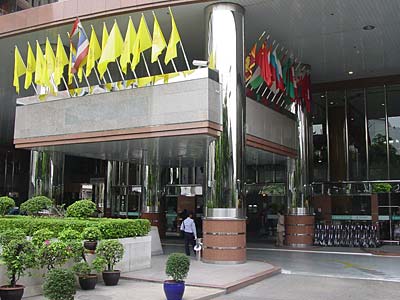Mandatory Health Insurance for Long-Stay Foreigners, aged 50 Years or older. Covid-19 Coverage.
Updated June 2021. See highlighted section a bit down the page
Intro : Who needs mandatory health insurance, as a precondition for being allowed to stay long-term in Thailand
In May 2019, in short succession, regular reports were published in English-language newspapers in Thailand, stating that health insurance would become mandatory for 50+ years old foreigners, staying long-term in the country. This would apply for expats on the long-stay non-immigrant O-A visa, that is valid for one year.
Now it is time to reassess our previous statement that health insurance would be mandatory for most or all 50+ old retirees in Thailand. At present, the rules may be certain, but they are surely poorly explained, and people likely to be affected do not really know whether to hurry and get an insurance (as outlined below) or remain self-insured, as quite a few are (not a good idea in our opinion).
Personally, we went to Thai Immigration at Chaengwattana, mid-januari 2020 and also in 2021, and got through the procedure without anybody asking about health insurance (which I have), so once at the end of the session with the immigration officer, I asked : what about health insurance ? The short cryptic answer was : you do not need it, because you are a 'non'. Well indeed, in my passport I see a few times mentioned 'non' and then something, and I take it 'non' simply means a non-immigrant visa. If this rule would apply to all, there would no need to worry for most of us.
It is a bit more complicated (or simple) than that : If you have a non-O visa, you do not need to have a health insurance (at this moment), if you have a non O/A visa (we understand a retiree visa obtained outside Thailand), you will need the mandatory insurance.
Another story doing the rounds : Preexisting rules when one applies for a retirement visa, will remain, that is old rules are grandfathered, not to worry about any new regulation regarding insurance now. New rules are only for those applying (or having applied) after end October 2019, when they were implemented.
Still, it is not all clear at the moment. One practical solution we suggest : go a few weeks or even a month before you need an extension to Thai Immigration. You will then personally find out what applies in your particular case. If you need no health insurance, so be it (we still suggest you get health insurance, and a better one than the schemes suggested below). If you do need insurance, you still have a few weeks left, to sort things out, and get one.
What insurance scheme is mandatory, and which insurance companies are providing it.
Original coverage proposed in 2019 up to mid-2021 : Insurance coverage should be for at least 400,000 baht in inpatient expenses, and 40,000 baht in outpatient expenses.
This requirement has now been updated. The change has been triggered by the Covid-19 Pandemic. Mid June-2021 it has been proposed and approved at a government cabinet meeting that the insurance requirement now has been increased to 100,000 U.S. Dollar (or 3 million Thai Baht), and coverage for Covid-19 is required. The information below will need to be updated, and rates for coverage might increase. If you are presently insured, it may be useful to ask your insurer directly, if coverage for Covid-19 is included! It may also be useful to make sure that the small print in the policy provides for coverage during pandemics! It will be possible to buy the insurance abroad. People not eligible for insurance due to old age, preexisting conditions, will need to be able to provide proof that they are able to be self-insured (= have enough money). Likewise, persons who have goverment sponsored insurance, will have to provide documents stating their coverage status.
A website of a (we think) newly established association, the Thai General Insurance Association, has been put online, with links to local insurance companies that have apparently especially created new health insurance policies for the government initiated insurance scheme.
The reasoning is simple : Some foreigners did not pay their bills after using medical services in Thailand. As reported in the Nation Newspaper dd. May 2019, a representative of the International Health Division (Health Service Support Department), stated that foreigners incurred non-paid medical bills amounting to 349 million baht and 305 million baht respectively in 2017 and 2018. Nowhere is it clear however how much of these unpaid bills were incurred by long-stay foreigners and how much by 'regular' tourists, which are more numerous. Personally, we were quite surprised to notice that up to a fifth of foreign visitors using medical services, did not pay for them. (565,000 out of 3.3 million visits in 2017 ; 680,000 out of 3.42 million visits in 2018).
Some easy mathematics : If one compares the number of unpaid visits, with the money amount of unpaid medical bills, we are talking about around 500 baht (!!!) per visit. We would not be surprised if some errors had slipped into the numbers provided by the Health Ministry.
In any case, if the non-paid medical bills amounted to 349 million baht and 305 million baht for the years 2017 and 2018, we are clearly talking about rather small amounts of money, maybe not quite necessitating a drastic scheme as outlined below.

Entrance to Bumrungrad Hospital. Very popular with foreigners. Make sure you look into your wallet before checking in, even with the 'mandatory' health insurance.
Initially there were only 6 insurance companies providing insurance for non-immigrant visa longstay foreigners. In 2021 however, a total of fifteen companies were already available. They did not get any heads-ups regarding the change in coverage requirements mid 2021. Therefore present coverage choices on their websites are not yet updated. We will follow up on this. Premiums and coverage costs listed below must be considered as approximate and liable to change.
Selection of participating insurance companies (2020) :
Thai Health Insurance Public Co. Ltd. (see below)
LMG Insurance Public Co. Ltd. (does only provide info about health insurance in general)
The Viriyah Insurance Public Co. Ltd. (see below)
Pacific Cross Health Insurance Public Co. Ltd. (you need to contact company for info)
Falcon Insurance Public Co. Ltd. (see below)
Thaivivat Insurance Public Co. Ltd. (see below)
AXA Insurance Public Co. Ltd. (see below)
Navakij Insurance Public Co. Ltd. (see below)
Dhipaya Insurance Public Co. Ltd. (see below)
Asia Insurance 1950 Public Co. Ltd. (no dedicated webpage for our insurance of interest)
Aetna Health Insurance (Thailand) Public Co. Ltd. (doen not provide insurance rates)
Sompo Insurance (Thailand) Public Co. Ltd.
(only Thai language ???)
Interestingly, all these companies are listed on the Thai Stock Exchange or on Southeast Asian exchanges.
Bangkok Insurance Public Co. Ltd. was initially listed, but now seems to have disappeared.
Overall Review
1) All companies have insurance schemes that follow the government's guidelines, with inpatient coverage up to 400,000 baht, and outpatient coverage up to 40,000 baht. Some companies provide also slightly higher coverage(s) for higher premiums.
2) Age limit : This insurance scheme is especially created for foreign long-stay visitors to Thailand above the age of 50. It is difficult to get a new insurance policy past the age of 70 years. Past the age of 80 years, you will often not be able to renew your policy.
3) Insurance Premiums
1) for 61-65 years old insured persons (caution : insurance policies may differ somewhat between companies). We choose the program which offers 400,000 baht coverage per disability per year. Sometimes there are other more expensive coverage schemes.
Thai Health Insurance : 21,037 baht (inpatient) + 15,344 (outpatient) ; after 65 and upto 80 years old only renewing.
The Viriyah Insurance : 59,150 baht ; only till age 70
Falcon Insurance : 38,490 baht ; only renewal from age 66 till age 80
Thaivivat Insurance : 59,000 baht ; renewal only from age 76 till age 100
AXA Insurance : 59,822 baht ; only renewal from age 71 till age 75
Navakij Insurance : 48,000 baht ; up to age 80
Dhipaya Insurance : 65,518 ; renewal only from age 71 till age 80
2) for 81-85 years old insured persons (mostly renewal only, but remember MANDATORY ; do not forget, we are talking about insurance up to 400,000 baht per illness)
Thai Health Insurance : not available
The Viriyah Insurance :
not available
Falcon Insurance :
not available
Thaivivat Insurance :
120,000 baht (renewal only from age 76 till age 100)
AXA Insurance :
not available
Navakij Insurance :
not available
Dhipaya Insurance :
not available
So only one company seems to want to invest person past the age of 80, clearly there is a problem here !
So, premiums are rather high, even for 61-65 years old persons, and rise with advancing age. Getting a new insurance past age 70 seems to be difficult, and mostly renewals are only available till age 80. Actually we found only one company (Thaivivat Insurance) willing to insure up to age 100. Pacific Cross is not reviewed here because they do not provide insurance rates online, but we noticed that they also provide coverage up to age 99 (renewals only from age 75 till age 99).
We can only say that the premiums are very high, for the limited coverage that is being provided.

Using a wheelchair in Bangkok is hard enough. But does your insurance company cover equipment like this? Check your policy
4) Room rates
While there is coverage provided up to 400,000 baht, that does not mean that all expenses up to 400,000 will be reimbursed. Most insurance companies mentioned here, have ceilings for costs incurred during hospitalization or outpatient treatment. We will just list the ceiling for room and board, as covered by different companies.
Thai Health Insurance : 2,000 baht
The Viriyah Insurance :
2,500 baht
Falcon Insurance :
4,000 baht
Thaivivat Insurance :
4,000 baht
AXA Insurance :
2,000 baht
Navakij Insurance :
2,000 baht
Dhipaya Insurance :
4,000 baht
What this means is that the room & board costs above the insured amount, will have to be covered by the patient himself. You may want to check the room rates at your preferred hospital to see what this means.
5) Surgical fees
Same comments as at 4)
Thai Health Insurance : 30,000 baht (???)
The Viriyah Insurance : 100,000 baht
Falcon Insurance :
Actual costs (up to max of coverage)
Thaivivat Insurance :
Actual costs (up to max of coverage)
AXA Insurance :
30,000 baht (???)
Navakij Insurance :
50,000 baht
Dhipaya Insurance :
Actual costs (up to max of coverage)
You should surely not go for an insurance that offers surgical fees coverage less than the actual costs.
6) Outpatient visits
Every little bit helps insurance companies to increase their profits, and this is most visible with the coverage here for outpatient visits. There are limits per visit !!!
Thai Health Insurance : 2,000 baht
The Viriyah Insurance : 1,400 baht
Falcon Insurance :
1,500 baht
Thaivivat Insurance :
2,000 baht
AXA Insurance :
1,500 baht
Navakij Insurance :
1,500 baht
Dhipaya Insurance : 1,500 baht
Just recently we went to an ENT specialist at a well known hospital in Bangkok. We ended up paying around 4,000 baht, which included a doctor's exam and medication. So from the above you can estimate what your additional expensed will be, with different insurance schemes.

Generic drugs can be obtained at a fraction of the cost of 'brand name' drugs. However, only in pharmacies outside major hospitals.
7) Miscellaneous
Information provided by visiting the websites is preliminary. There will certainly be exclusions of certain diseases, exclusions of pre-existing conditions, waiting period after the policy has started for certain conditions etc. Your insurance premium and the conditions excluded in your particular case, will be individually determined.
What it means is : you appy for a certain coverage, and are expecting to pay a certain amount for this service. After evaluating your information, the company will make you a proposal that may differ (=higher) from your initial estimates.
Conclusions :
Overall, we find these recent developments unsatisfactory.
1) We are in favor of everybody having health insurance, though not necessarily the way it is being suggested here.
2) The amounts lost by medical service providers, seem to rather modest, not necessitating making health insurance mandatory. We however suspect that there are some errors in the data provided by health authorities.
3) The premiums are high, and the coverage is low. Some restrictions are rather pathetic (like the limit covered per outpatient visit). Even when paying the high premiums, you can be expected to pay additional costs for any substantial surgical intervention.
4) Above age 75 and especially above age 80, it will be difficult or impossible to apply for a new health insurance, and then only when paying rather exorbitant premiums, in the end approaching the maximum coverage you can get. So, we can assume, that some really old persons, are going to be forced out of the country eventually.
4) There is no insurance company that really stands out as being the best value. All offer somewhat different policies, at least we can say that there is no significant collusion here. If we have to give a preference, we would choose Thaivivat Insurance, since it provides for renewals up to age 100, covers actual costs for surgery, covers room rates up to 4,000 baht.
5) We actually have a health insurance with a company mentioned but not reviewed here. The interesting thing here is that we pay just about 20 % more for our age group as mentioned in this particular insurance scheme, while potentially getting much higher benefits. But we have room and board coverage up to 10,000 baht, and a maximum coverage per disability of 10,000,000. So this is a huge difference, and we do not quite know what is going on here with this government initiated insurance scheme.
In any case, you may want to look into trying to get a 'regular' health insurance, with any of the insurance companies that provide such. You may make a better deal.

